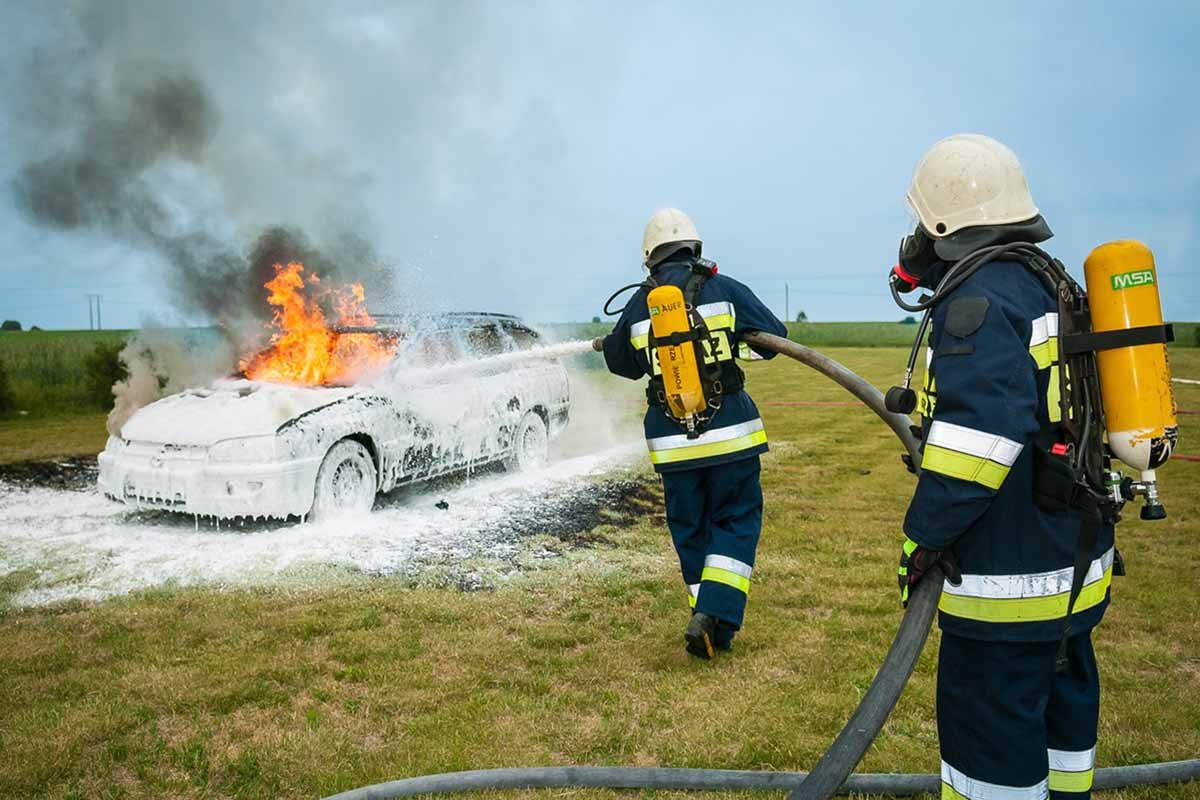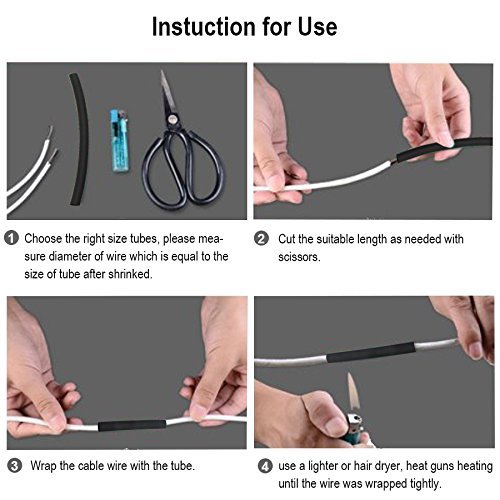You usually have to splice speaker wires to connect them to your amp and speakers. If you forget to apply electrical tape, the wires will stay exposed.
While this undoubtedly saves time, many people do wonder whether exposed speaker wires are safe, and whether they can cause a fire in your home.
Even though the voltage of exposed speaker wires is very low, there is a chance that a conductive material may touch a wire and cause a short circuit. A short circuit can cause a spark to fly and ignite flammable materials, causing a fire. However, the likelihood of this happening is relatively low.
This article will explain why exposed wires are a fire hazard and how you can prevent them from causing fires.
I’ll also explore whether an in-wall speaker wire can cause a fire and whether exposed speaker wires can shock you.
Page Contents
How Exposed Speaker Wires Can Cause a Fire
We know that speaker wires don’t carry a whole lot of power.
The voltage in speaker wires is somewhere between 5 and 30 V, and if you’ve ever touched an exposed speaker wire, you’ll know from experience that not only is it not very powerful, the voltage is too low for you to feel it.
Nonetheless, it’s still a live wire.
Even 12 V is more than enough to create a spark. So, an exposed speaker wire is a fire hazard, no matter how low the voltage.
There are two main ways in which a wire can cause a fire.
The first one is that the exposed wire overheats. As it gets hotter and hotter, the surrounding insulation melts.
For this reason, the insulation material is not easily flammable.
However, there is always a chance that your fuzzy carpet will catch on fire instead.
The other far more common scenario is a short circuit. But what even is a short circuit?
A short circuit happens when electricity returns to the ground via an alternative pathway instead of the wire.
For example, a drop of unfiltered tap water on an exposed live wire will cause a short circuit.
Or maybe there’s a small screw you forgot about when assembling your computer.
Any type of conductive material can cause a short when it touches the exposed wire.
This is a major fire hazard and can happen even when you’re not at home.
Can an In-Wall Speaker Wire Cause a Fire?

An in-wall speaker wire without the correct CL rating can cause a fire. The wire can overheat inside the wall because it’s insulated and self-ignite.
You can’t see a fire inside your wall at first, so it’s very dangerous to use the wrong speaker wire.
Your insurance company will reject your claim if they believe that you knew that the wiring in your home was a fire hazard but chose not to replace it.
Depending on your insurance company, this can extend to opting not to replace wires with the wrong CL rating.
Thus, keeping the wrong kind of speaker wire for an in-wall installation could cost you thousands of dollars.
The CL cable rating system can help you find the right speaker wire for your needs. That said, most people will require CL2 cables for in-wall installation.
If you’re looking for a CL2 wire, I recommend the Mediabridge CL2 Speaker Wire from Amazon.com. This product is made using high-strand count oxygen-free copper and boasts a flexible insulated jacket color-coded for polarity.
The chance of a CL2 wire being a fire hazard is close to zero. That said, you will still have to cover any exposed wire. More on that later.
Can an Exposed Speaker Wire Shock You?
An exposed speaker wire will not be able to shock you because there isn’t enough current going from the amplifier, and the voltage is very weak. If the amplifier is set to maximum volume, you may feel a slight tingle, but it’s unlikely to be painful.
Most passive speakers are rated at somewhere between 1 and 10 amperes, and the voltage is usually around 10 V.
Many people believe that it’s the current that shocks you, but that’s not necessarily true. You must have a combination of high voltage and current to get electrocuted.
This funny YouTube video by ElectroBOOM demonstrates how enough current can melt a wire in seconds but can’t shock a human:
So, even if you have a 1000 W amplifier, the voltage is still too low to cause any harm.
Nonetheless, you should never touch an exposed speaker wire when the amplifier is still plugged in.
Make sure everything is plugged out before you do your wiring.
Can Speaker Wires Stay Exposed at Endpoints?
You shouldn’t leave speaker wires exposed at endpoints. It’s fairly common to plug an exposed wire directly into the speaker or even amplifier.
However, this is very dangerous and unnecessary. It’s a potential fire hazard, and your sound quality will suffer as well.
Some older speakers and amps won’t let you use speaker plugs or any other kind of connector.
You have to tighten a screw to hold the wire in place.
But if your speakers support banana connectors, I recommend using them instead. They let you connect the speaker wire like a regular cable.
Exposed wire endpoints can be a fire hazard. The chance of a short happening is extremely slim, but there’s still the issue of overheating.
If something goes wrong with the current flowing to the speaker, the wire could get hot and melt the speaker housing.
You’ll smell the plastic melt and burn if this happens.
If you’re looking for banana connectors to protect your wires, I recommend the Monoprice Gold-Plated Banana Plugs from Amazon.com.
They come with color-coded rings so you can maintain the right polarity, and the plugs are plated with 24K gold to make them corrosion-resistant.
Installing banana plugs is simple. Here’s what you need to do:
- Strip speaker wire that is the length of the banana plug.
- Unscrew the housing from the banana plug. The housing is a cylinder-shaped piece of metal that sits on the outer part of the plug.
- Pull the speaker wire through the housing.
- Loosen the tiny screw on the banana plug. Some banana plugs have two screws on each side.
- Put the speaker wire into the banana plug all the way in.
- Tighten the screw.
- Screw the cylinder housing onto the banana plug.
You can now plug the wire into your speaker and amp, just like any other cable.
Can Exposed Speaker Wires Cause a Fire in a Car?

Exposed speaker wires can cause a fire in your car because cars have several flammable materials in the interior that can catch on fire if there is a short circuit.
Short circuits are particularly dangerous in cars because a car is literally made of metal.
The risk is so high that if even a tiny screw on the body of the car touches the wire, it can cause a short circuit.
Shorts don’t always create a spark, so you might not even notice the bare wire at first.
But even one small spark is sufficient to ignite your car’s carpet and can turn your car into a lost cause.
If you aren’t keen on losing thousands of dollars so you can replace your vehicle, make sure that all wiring in your car is properly insulated to prevent a fire.
How To Protect an Exposed Speaker Wire
You can protect an exposed speaker wire by insulating it. Use heat shrink tubing or a piece of electrical tape to insulate the exposed wiring.
Additionally, you should install an appropriate plug on the speaker wire endpoint.
I prefer heat shrink tubing over electrical tape for speaker wires. It looks better and protects the wire a bit better too.
After you splice a speaker wire, pull the wire through a piece of shrink tubing.
You should use a heat gun to shrink it. If you don’t have one, use a lighter but be very careful.

The tubing can withstand a lot of heat, but the speaker wire sleeve probably can’t. You will need to use the right shrink tubing length and width to get a complete seal.
I recommend using the Milapeak Shrink Tubing Assortment Kit from Amazon.com.
It includes 625 pieces of varying sizes, all stored in a nice plastic case. Additionally, the tubes are all RoHS compliant.
Electrical tape is also a good choice. However, you will need to make sure to wrap around the exposed wire as well.
You shouldn’t plug exposed wire directly into the speakers – instead, use a banana plug as explained above.
Outdoor Speaker Wires
Outdoor speaker wires need to have additional protection because UV radiation from the sun can damage the wire sleeve.
Furthermore, critters love to nibble on wiring, which is another hazard you need to consider. Given these factors, a PVC pipe is perfect for protecting your wiring.
Pull the speaker wire through a thin PVC pipe and add resin on each end to seal it – and you’re good to go!
Final Thoughts
The electric current that flows through your speaker wire isn’t very powerful and cannot shock you.
However, exposed speaker wire can still cause a fire. If the wire short-circuits or overheats, any flammable material around the wire will ignite.
You must insulate any exposed speaker wire to prevent fires.

